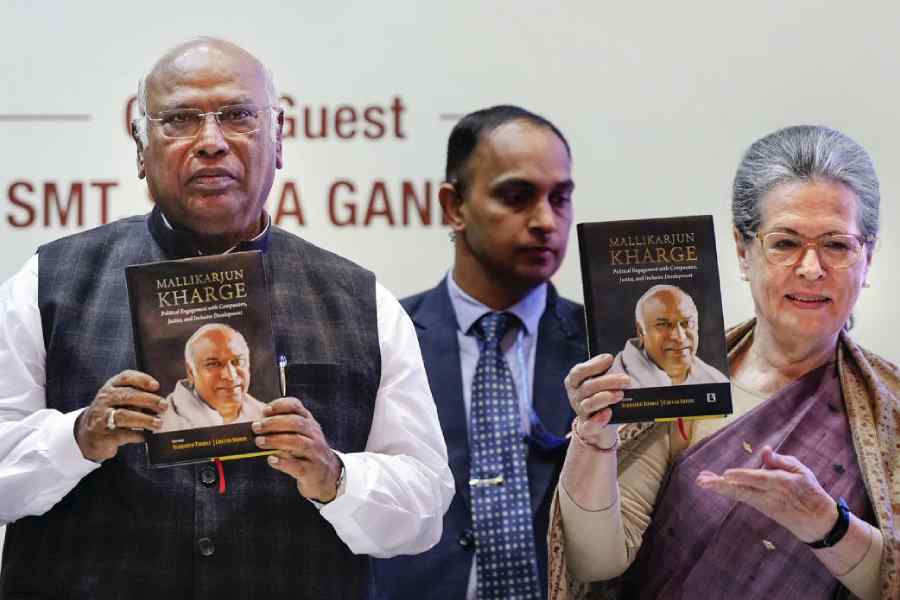If someone who faced debilitating poverty, discrimination and violence since childhood grows up to exemplify compassion and justice, not hate and bitterness, despite attaining positions of power, he must be the character people would look up to in times of exceptional crisis.
That sums up the message coming out of a book release event here on Wednesday as Congress president Mallikarjun Kharge was very subtly portrayed as the leader of the Opposition combine INDIA without actually being projected as the candidate for Prime Minister. That Sonia Gandhi was part of the group publicly creating this impression reveals the Congress’s thinking despite Rahul Gandhi being the real power behind the political resistance to the Narendra Modi regime.
All the speakers at the function — T.R. Baalu of the DMK, Sitaram Yechury of the CPM, Manoj Jha of the RJD and Sonia — hoped Kharge was destined for bigger responsibilities and referred to his suitability for the leadership role in these difficult times. While these leaders are all part of INDIA (Indian National Developmental Inclusive Alliance), Jha and Baalu indicated RJD’s and DMK’s endorsement of Kharge’s leadership.
Stressing that Kharge was a bridge between Ambedkar’s emancipation and Nehru’s compassion, Jha said: “Abhishek Singhvi has written in this book that culmination hasn’t yet taken place. The culmination will be beautiful and very high.”
Singhvi, a party colleague, wrote in the book titled Mallikarjun Kharge: Political Engagement with Compassion, Justice, and Inclusive Development that Kharge had conquered many diverse peaks but the best is yet to come. The RJD leader’s reference to “very high” can only be the Prime Minister or President of India, which can be more precious for him than the post of Congress chief.
Stressing virtues like credibility and sincerity, Yechury said it was Kharge’s responsibility to unite the Opposition and lead the fight against the Modi regime, which has had a dehumanising impact on the Indian polity.
Balu described Kharge as the “torch-bearer of social justice”, saying: “You have to play a bigger role… in the context of 2024. You have handled the great challenges the Congress was faced with in these times. You are nurturing the Nehruvian culture with the help of Sonia Gandhi and Rahul Gandhi. But you don’t have to lead only the Congress but also the country.”
Jha highlighted Kharge’s simplicity and democratic values, recalling how he treated every single Opposition leader at the meetings. “His commitment to justice, equality and freedom is not academic. It is born out of lived experience.”
Both he and Yechury dwelt on the exceptional quality of Kharge’s personality, explaining how he didn’t allow hate and bitterness to overtake his emotions despite losing his family. Much of Kharge’s family had been burnt to death when he was a child. He was brought up by his father who was a labourer in a mill.
As if echoing the sentiment, Sonia said: “Faced with communalism and discrimination at a tender age, he consciously chose to be secular and liberal. Faced with poverty and discrimination, he courageously embraced compassion towards all beings. This is what drove him, consciously, to choose to work for the public good, to empower the weakest and most vulnerable sections of our society, and to free them from the shackles and hurdles he himself had known closely at first hand.”
She added: “Fifty years is a long period in politics. Kharge didn’t just survive its unpredictable course, he continued to rise higher and higher throughout his political career. Not once did he compromise on his ideology, not once did he drift away from the cause of the poor, not once did he compromise on dignity and conduct to win political battles. That’s why, today, Khargeji stands tall as the president of the Congress.”
Calling him a pillar of strength for her, Sonia said: “He helms the Congress at a crucial juncture. Those in power, unhinged from constitutional and institutional values, are subverting or demolishing all those institutions, systems and principles by which India has thrived since our Independence. As a strong organisational leader who enjoys our confidence, Kharge is best suited to lead the Congress in this historic battle for India’s soul. In this, he has my steadfast support and that of the Congress party.”
The book is edited by Sukhadeo Thorat and Chetan Shinde. It has essays written by 73 contributors from different parties, including the BJP. Though the book was supposed to have come out earlier to commemorate Kharge’s 50 years in electoral politics, it got delayed by two years. The book was conceived and prepared before he became the party president.
Thorat said the “biography unveils lesser-known facets of Kharge’s persona as a political luminary, social reformer, and educator over five decades. It covers his family background, contributions to Karnataka’s economic development, and his commendable role as an Opposition leader. But most unique is his role as a social reformer to reform the iniquitous caste society towards the goal of equality, freedom, and fraternity, including education for marginalised groups through the Education Society with 18 education institutions. Notably, it delves into his profound role as a social reformer, drawing inspiration from Ambedkar and Buddhist ideology for socially inclusive development”.











